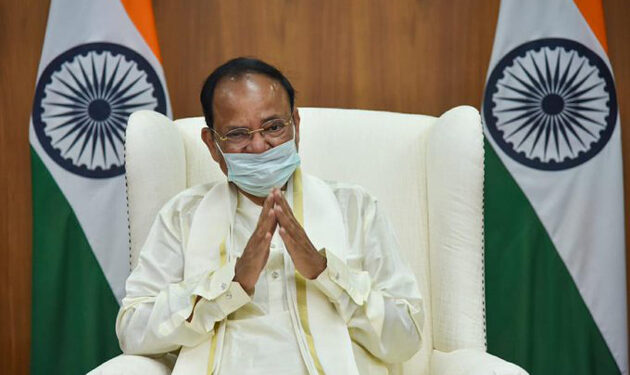NE NEWS SERVICE
JAMMU, APR 9
Vice-President M Venkaiah Naidu on Friday called upon national institutions like IIMs to offer innovative courses and diplomas based on new market realities and demands of the fourth industrial revolution.
The Vice President presenting awards to students during the 3rd and 4th convocation ceremony of IIM Jammu today.#IIMJammu @IIMJammu pic.twitter.com/fqe3GtYb6U
— Vice President of India (@VPIndia) April 9, 2021
He also stressed the need for reorienting higher education in tune with the realities of the world and called for bringing diverse fields like agriculture, business, technology, humanities and management together through these courses.
The most remote areas and most underprivileged students should be benefitted from the technological revolution in education. #IIMJammu @IIMJammu pic.twitter.com/x4Xr1uLkb7
— Vice President of India (@VPIndia) April 9, 2021
“This is the spirit of the multidisciplinary push of the new education policy. Remember, we cannot solve the problems of the future with the same superficial, segregated approach of the past,” he said.
The vice-president was addressing the 3rd and the 4th convocation of Indian Institute of Management (IIM) Jammu. Union Minister Jitendra Singh and J&K Lt Governor Manoj Sinha also attended the function during which 148 students of the Master of Business Administration (MBA) programme were conferred with degrees on completion of their courses.
The convocation for two batches were organised together as the last year’s event could not be held due to the coronavirus pandemic.
IIM Jammu Chairman, Board of Governors, Milind Kamble and Director B S Sahay, besides other staff, the passing out students their parents were present on the occasion.
Noting that the coronavirus pandemic has shown the necessity and potential of technology in delivering education, Naidu called for more extensive and prudent use of technological tools.
However, in this process, the existing digital divide should not widen, he cautioned.
“The most remote areas and most underprivileged students should be enabled to benefit from this technological revolution,” he emphasised.
He said national institutions like IIMs need to offer innovative courses and diplomas based on new market realities and demands of a fourth industrial revolution.
Underlining the importance of developing a mindset that encourages innovation and institutional reform which fosters creativity and promotes excellence, Naidu told the students that as future managers they have to respond to the very rapidly changing world.
“Your ability to take decisions in an uncertain world and your agility to adapt to new contexts will become very crucial,” he added.
He advised institutions of higher education to “adapt, evolve and respond” to these never-seen-before situations.
Calling upon the aspiring entrepreneurs, managers and consultants to identify innovations at the grassroots and use their expertise to achieve scale for indigenous solutions, he urged them to bring in technology to complement the traditional skills and increase farm productivity to help farmers.
Naidu also urged the graduating management students to work with farmers in improving the marketing of farm produce.
“e-NAM is a great tool for better price realisation. This should be further scaled up and new innovations be brought into post-harvest facilities,” he said.
“India is making great strides to fulfilling the aspirations of people. The youth is the biggest resource and partner for our country in its journey of development. Endowed with immense demographic dividend, we have the potential to achieve anything,” he said.
Describing skill development and quality education as ”crucial development accelerators”, he stressed the need for enhancing access to and quality of education.
Naidu also stressed that industry-institute linkages be strengthened further. “Our industry will also greatly benefit from the fresh perspectives young minds can offer,” he added.









